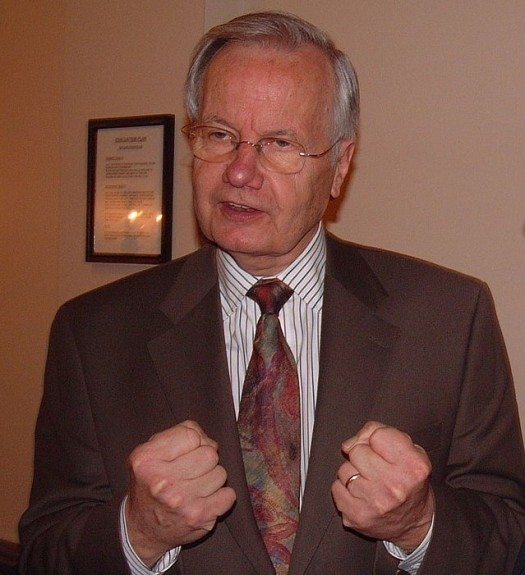Culture & Media
Celebrating Bill Moyers’ 80th Birthday

Bill Moyers, who turned 80 on Thursday, has been one of the most prolific and influential figures in American journalism. Not content just to diagnose and document corporate and political malpractice, Moyers has regularly taken his cameras and microphones to cities and towns where unions, community organizations, environmental groups, tenants rights activists and others were waging grassroots campaigns for change. Moyers has given them a voice. He has used TV as a tool to expose political and corporate wrongdoing and to tell stories about ordinary people working together for justice.
He has introduced America to great thinkers, activists and everyday heroes typically ignored by mainstream media. He has produced dozens of hard-hitting investigative documentaries uncovering corporate abuse of workers and consumers, the corrupting influence of money in politics, the dangers of the Religious Right, conservatives’ attacks on scientists over global warming and many other topics. A gifted storyteller, Moyers’ TV shows, speeches and magazine articles have roared with a combination of outrage and decency, exposing abuse and celebrating the country’s history of activism.
Moyers has spent most of his broadcast career on public television, whose audience is considerably smaller than that of the major networks. But his influence — through his documentaries, interviews, books, magazine articles and speeches, and because of the ripple effects of his calls to conscience — has been great nonetheless. He has received over 35 Emmy Awards (including a Lifetime Emmy), a lifetime Peabody Award, an Alfred I. DuPont-Columbia University award, a George Polk Career Award (his third Polk award), induction into the Television Hall of Fame and many other honors for his contributions to journalistic integrity and investigative reporting.
Last October, Bill Moyers announced that he was retiring and that his weekly show, Moyers & Company, would end January 3. Three weeks later, in response to an outpouring of emails, letters and Facebook comments urging him to reconsider, Moyers recanted. He has continued to host the show. His only pushback was to recast the show from an hour to a half-hour format. Keeping up with modern technology, Moyers now has a website that includes not only videos of his TV interviews but also many articles (by Moyers and others) about contemporary politics and activism.
Moyers comes by his progressive class-consciousness and moral outrage naturally. Neither of his parents went to high school. Dirt-poor, they worked as farmers until they could not make it anymore because of bad weather and the boll weevil. When Moyers was born, the family lived in southeast Oklahoma, where his father was making $2 a day working on highway construction. When he got a job driving a creamery truck, they moved to Marshall, Texas.
In a 2008 show Moyers recalled:
The Great Depression knocked him down and almost out, and he struggled on one pittance paying job after another, until finally, late in life, he had a crack at a union job. His last paycheck was the most he’d ever taken home in a week, $96 and change, and he was proud of it. I saw then how unions struggled to preserve the middle class, and can make the difference between earning a living wage and being part of the working poor.
Moyers and his older brother went to Sunday school at Central Baptist Church, where, as he recalled, “we didn’t have baseball cards; we had Bible cards depicting scenes from the scriptures.”
Moyers was recently asked what role his religious faith has played in shaping his political views and journalism.
“When I was growing up, I never heard anyone pray, ‘Give me this day my daily bread,'” Moyers said, “It was always, ‘Give us this day our daily bread.’ That stuck. We’re all in this together. I take ‘We, the People’ seriously because I don’t know how we build a civilization without reciprocity. There’s a moral contract in that Preamble. And although I was brought up in a culturally and religious conservative culture, as a Baptist I was taught that no one has the right to subpoena your conscience.”
On his 16th birthday, Moyers went to work for the local paper, the Marshall News Messenger. One of his first stories was the “Housewives’ Rebellion,” about a group of 15 women who refused to pay Social Security taxes for their maids because they believed that the insurance program was unconstitutional. Their lawyer — former right-wing Congressman Martin Dies Jr.– lost the case. Moyers was thrilled when the Associated Press picked up the story.
Only later did it dawn on him that that the newspaper never covered stories about Marshall’s African Americans, who made up half the town’s population. “For all practical purposes the staff of the paper pretended half of Marshall didn’t exist,” he later wrote.
Moyers left Marshall in 1954 to attend North Texas State College (now University of North Texas). He spent a summer interning on then-senator Lyndon B. Johnson’s reelection campaign. Impressed with the young Moyers, LBJ suggested that he transfer to the University of Texas in Austin. There he majored in journalism and the liberal arts while working full-time as assistant news editor for KTBC-TV for $100 a week.
Graduating in 1956, he studied theology at the University of Edinburgh in Scotland and at Southwestern Baptist Theological Seminary, whereas the weekend pastor of two small rural churches he inflicted “amateurish wisdom on very patient and loving congregations of mostly farmers and their spouses,” as he told NPR’s Terry Gross in a 1996 interview. In 1959, he moved to Washington, DC, to work for Johnson. He helped run LBJ’s 1960 vice presidential campaign as John F. Kennedy’s running mate.
Moyers was a founding organizer of the Peace Corps in 1961 and was appointed its deputy director by President Kennedy. After Kennedy was assassinated, LBJ brought Moyers to the White House as his assistant for domestic policy with responsibility for shepherding the task forces that led to LBJ’s Great Society program.
Moyers played a key role in helping LBJ pass the Civil Rights Act of 1964 and the Voting Rights Act of 1965. He was with LBJ when the president met with Martin Luther King Jr. at the White House and tried to convince the civil rights leader to call off further protests, arguing that they would harden white resistance and make it impossible for him to win over southern senators and representatives, with whom Johnson had often successfully negotiated as Senate majority leader. King disagreed, reminding LBJ of the history of murders, lynchings and humiliation, insisting that the protests were necessary to draw attention to the need for civil rights legislation.
As Moyer recalled: “LBJ listened, as intently as I ever saw him listen. He listened, and then he put his hand on Martin Luther King’s shoulder, and said, in effect: ‘OK. You go out there Dr. King and keep doing what you’re doing, and make it possible for me to do the right thing.'”
TIME magazine put Moyers on its October 29, 1965 cover, under the headline: “L.B.J.’s Young Man In Charge of Everything.”
By 1966 Moyers had reluctantly agreed to be the president’s press secretary, but he found it increasingly difficult to defend LBJ’s escalation of the war in Vietnam. “The things I really cared about–poverty, the Great Society, civil rights–were all being drained away by the war,” he recalled. “The line that keeps running through my mind is the line I never spoke: ‘I can’t speak for a war that I believe is immoral.'”
Moyers resigned from the White House in 1967 and became the publisher of Newsday, a daily newspaper that primarily served New York’s Long Island suburbs. “When I left the White House I had to learn that what matters in journalism is not how close you are to power, but how close you are to the truth,” he said. With Moyers at the helm, Newsday expanded its news agenda, recruited a wide range of writers and won many major journalism awards.
But Harry Guggenheim, Newsday‘s conservative owner, disapproved of the paper’s liberal innovations under Moyers, particularly what he called its “left-wing” coverage of the antiwar movement. In 1968 Guggenheim signed an editorial supporting Richard Nixon’s presidential candidacy, while Moyers published his support of Hubert Humphrey.
Moyers resigned in 1970 and took a 13,000-mile bus trip around the country, armed with a notepad and tape recorder, interviewing people for his best-selling book Listening to America: A Traveler Rediscovers His Country. That year, he began his long relationship with public television, interrupted by a decade (1976-1986) at CBS News.
In order to maintain his journalistic independence, Moyers formed his own production company and raised all the funds for his many productions. At PBS, Moyers, a master of the long interview, has had the freedom to craft his own programs, including Now with Bill Moyers, Moyers on America, Bill Moyers Journal and Moyers & Company, which began in 2012.
He has interviewed important thinkers and activists rarely seen on television, including organizers like Ernesto Cortés, Sarita Gupta, Madeline Janis, Bill McKibben and Ai Jen Poo, historians like Howard Zinn and Harvey Kaye, scientists like René Dubos, philosophers like Joseph Campbell, theologians like Karen Armstrong, economists like Joseph Stiglitz, and provocative writers such as Ta-Nehisi Coates, Wendell Berry, Michelle Alexander and Naomi Klein. He has produced investigative documentaries on a wide variety of topics, including the cost of the Iraq and Afghanistan wars on local communities, campaign finance, inadequate funding for public schools, the rise of the Religious Right, global warming, the dumping of hazardous waste and, in Trade Secrets, the chemical industry’s poisoning of American workers and communities.
Moyers’ 11-part mini-series documentary in 1987, In Search of the Constitution, celebrated the document’s bicentennial, examined its use and abuse by political leaders and included interviews with sitting Supreme Court justices and prominent legal scholars.
Bill Moyers and his colleague Marty Koughan were putting the finishing touches on a 1993 Frontline documentary investigating pesticides in food when a peculiar thing happened. As he related in his book, Moyers on America–A Journalist and His Times:
The [chemical] industry somehow purloined a copy of our draft script and mounted a sophisticated and expensive campaign to discredit our broadcast before it aired. A Washington Post columnist took a dig at the broadcast on the morning of the day it aired–without even having seen it–and later confessed to me that the dirt had been supplied by a top lobbyist for the chemical industry.
In addition, the American Cancer Society distributed talking points to columnists and other opinion makers that were written by Porter Novelli, a public relations firm that also had several chemical companies as clients.
Later that year, the documentary, In Our Children’s Food, won an Emmy for investigative journalism. But the experience was one more reminder to Moyers of the corrosive effect of corporate power on the common good.
Moyers’s 2007 documentary Buying the War reported how most of the press corps became complicit with the Bush administration’s invasion of Iraq. “If the watchdog doesn’t bark,” Moyers said about the show, “how do you know there’s a burglar in the basement? And the press is supposed to be a watchdog.”
In a June 2008 show about America’s “new Gilded Age,” Moyers documented the fact that the nation’s widening economic divide was making it harder and harder for working families to make ends meet. During the broadcast, Moyers said, “Can we put aside that old canard spouted by Wall Street apologists every time someone calls for greater equity between working people and the rich? Truth is, there’s been a class war waged in America for 30 years now from the top down, and the rich have won.”
Moyers interviewed Glenn Greenwald, then a blogger at Salon, about government secrecy and other topics in 2009, years before Greenwald became a household name as a result of his reports exposing United States and British surveillance program based on classified documents disclosed by Edward Snowden.
The Nation called Moyers “the most radical presence on broadcast and cable television” but also pointed out that, to generate lively debate, he has consistently invited conservative thinkers onto his show, including Richard Viguerie, Cal Thomas and Ron Paul.
Moyers has often used his power as a broadcast journalist to uncover the unseemly entanglement of big business and politicians. “If a baseball player stepping up to home plate were to lean over and hand the umpire a wad of bills before the pitch, we would know what that was: a bribe. But when the tobacco industry stuffs $13 million in the pockets of the merry looters in Congress and gets protection in return, we call that a campaign contribution.”
Three years ago, in collaboration with the Center for Media and Democracy, Moyers exposed the inner workings of the American Legislative Exchange Council (ALEC), a corporate front-group that promotes state-level legislation designed to increase corporate profits at public expense without public knowledge.
In a broadcast about the concentration of media ownership, he pointed to “the paradox of Rush Limbaugh, ensconced in a Palm Beach mansion massaging the resentments across the country of white-knuckled wage earners, who are barely making ends meet in no small part because of the corporate and ideological forces for whom Rush has been a hero.”
Moyers admires what he called the “Mount Rushmore of muckraking” journalism, including Lincoln Steffens, Ida Tarbell, Upton Sinclair and I. F. Stone.
But if he could be anyone today, Moyers said, it would be Ambrose Bierce.

-

 Latest NewsJune 17, 2025
Latest NewsJune 17, 2025A Coal Miner’s Daughter Takes on DOGE to Protect Miners’ Health
-

 Beyond the BorderJune 10, 2025
Beyond the BorderJune 10, 2025Detained Man Says ICE Isn’t Treating His Colon Cancer
-

 Column - State of InequalityJune 5, 2025
Column - State of InequalityJune 5, 2025Budget Cuts Threaten In-Home Assistance Workers and Medi-Cal Recipients
-

 Column - State of InequalityJune 12, 2025
Column - State of InequalityJune 12, 2025‘Patients Will Suffer. Patients Will Die.’ Why California’s Rural Hospitals Are Flatlining.
-

 Column - California UncoveredJune 18, 2025
Column - California UncoveredJune 18, 2025Can Gov. Gavin Newsom Make Californians Healthier?
-

 Featured VideoJune 10, 2025
Featured VideoJune 10, 2025Police Violently Crack Down on L.A. Protests
-

 Latest NewsJune 4, 2025
Latest NewsJune 4, 2025Grace Under Fire: Transgender Student Athlete AB Hernandez’s Winning Weekend
-

 Striking BackJune 3, 2025
Striking BackJune 3, 2025In Georgia, Trump Is Upending Successful Pro-Worker Reforms

